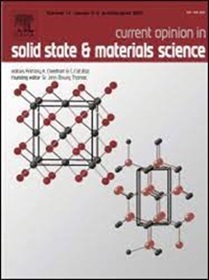导电水凝胶:生物电子学和环境应用
IF 13.4
2区 材料科学
Q1 MATERIALS SCIENCE, MULTIDISCIPLINARY
Current Opinion in Solid State & Materials Science
Pub Date : 2025-01-01
DOI:10.1016/j.cossms.2024.101213
引用次数: 0
摘要
柔性多模态传感器由于其可调的结构性能和对电信号的敏感性,对各种环境的适应性以及出色的机械性能而受到持续关注。然而,由橡胶、弹性体和其他聚合物制成的传感器有限的自修复能力、降解和可逆的自粘附性阻碍了它们的广泛应用。基于水凝胶的柔性传感器可以提供一种解决方案,它具有出色的可拉伸性、灵活性和生物相容性。然而,它们对外部能源的依赖限制了它们的潜力。因此,人们努力通过在水凝胶网络中加入官能团、添加剂或纳米填料来开发导电水凝胶,从而实现多功能可穿戴传感功能。本文综述了近年来水凝胶在自供电传感器中的应用进展,包括应变/压力传感器、电子皮肤传感器、压力/应变传感器、温度监测和湿度监测应用。此外,重点研究了自供电传感器的能量转换机制。它还提供了用于开发导电水凝胶的各种合成方法的简要概述。当前的审查还概述了当前的挑战,并提出了未来发展的潜在途径。本文章由计算机程序翻译,如有差异,请以英文原文为准。
Conductive Hydrogels: Bioelectronics and Environmental Applications
Flexible multimodal sensors have garnered continued attention due to their tunable structural performance and sensitivity to electric signals, adaptability to various environments, and outstanding mechanical properties. However, the limited self-healing capabilities, degradation, and reversible self-adhesion of sensors made from rubbers, elastomers, and other polymers have hindered their widespread application. Flexible sensors based on hydrogels, which offer exceptional stretchability, flexibility, and biocompatibility, could provide a solution. However, their reliance on external energy sources limits their potential. Thus, efforts have been made to develop conductive hydrogels by incorporating functional groups, additives, or nanofillers into the hydrogel network, which has led to multifunctional wearable sensing capabilities. This review discusses recent advancements in the use of hydrogels in self-powered sensors, including strain/pressure sensors, electronic skin sensors, pressure/strain sensors, temperature monitoring and humidity monitoring applications. Moreover, it focuses on the mechanisms of energy conversion in self-powered sensors. It also provides a concise overview of the various synthesis methods used in developing conductive hydrogels. The current review also outlines the present challenges, besides suggesting potential pathways ahead for future advancement.
求助全文
通过发布文献求助,成功后即可免费获取论文全文。
去求助
来源期刊

Current Opinion in Solid State & Materials Science
工程技术-材料科学:综合
CiteScore
21.10
自引率
3.60%
发文量
41
审稿时长
47 days
期刊介绍:
Title: Current Opinion in Solid State & Materials Science
Journal Overview:
Aims to provide a snapshot of the latest research and advances in materials science
Publishes six issues per year, each containing reviews covering exciting and developing areas of materials science
Each issue comprises 2-3 sections of reviews commissioned by international researchers who are experts in their fields
Provides materials scientists with the opportunity to stay informed about current developments in their own and related areas of research
Promotes cross-fertilization of ideas across an increasingly interdisciplinary field
 求助内容:
求助内容: 应助结果提醒方式:
应助结果提醒方式:


